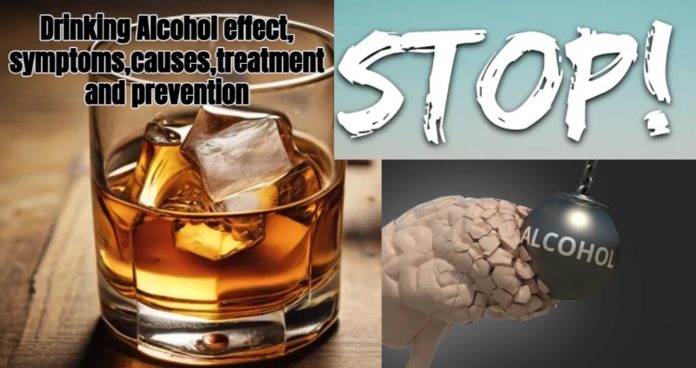Alcohol and alcoholism are the major public health issues that are affecting millions of lives today, all over the world. In social life, one drinks moderately; however, excessive drinking leads to addiction. There are serious consequences for the addicted and their families. Knowing the line between casual drinking and alcoholism helps in seeking help at the appropriate time.
Alcohol use disorder (sometimes called alcoholism) is a common medical condition. The nature of this disease is to result in several physical and psychological problems that can highly affect the daily life of a person. Recognizing the signs, causes, and effects of alcoholism is an important step towards prevention and treatment.
Symptoms
- Feeling a strong need to drink
- Not being able to stop or limit drinking
- Experiencing withdrawal symptoms, such as shaking or sweating
- Not being able to fulfill major responsibilities at work, school, or home, and not being able to care for one’s appearance
- As tolerance increased, larger quantities were necessary to produce same effect
Effects
- Liver damage (cirrhosis)
- Cardiovascular problems
- Mental health problems (depression, anxiety)
- Deterioration of social and family relationships
- Increased accidents and injuries
Causes
- Genetic predisposition
- Environmental factors. For example, peer pressure and stress
- Psychological factors. For example, trauma and mental illness
- Social and cultural influences
How to avoid Alcoholism
- Limit your alcohol intake
- Avoid risky drinking situations
- Get support from friends and family
- Manage stress with healthy coping strategies
- Stay informed about alcohol use risks
Prevention and Treatments
Prevention:
- Information and education campaigns
- Promotion of healthy lifestyles
- Early intervention in high-risk groups
Treatments:
- Detoxification and rehabilitation programs
- Cognitive-behavioral therapy (CBT)
- Medication (e.g., disulfiram, naltrexone)
- Support groups (e.g., Alcoholics Anonymous)
- Ongoing counseling and follow-up care
When to See a Doctor
- If you or someone you know is unable to control alcohol consumption,
- Experiencing withdrawal symptoms
- If alcohol use is affecting daily life and relationships,.
- When there are signs of liver damage or other health issues.
Alcoholism is a severe condition that requires attention and care. One needs to identify the symptoms and be able to associate them with the underlying causes so that one can seek proper treatment and support. Equally valuable in reducing the effects of alcoholism on society are preventive measures, education, and early interventions. If you or a loved one has problems with alcohol addiction, seek help from your health provider.
FAQs
-
What is the difference between alcohol use and alcoholism?
Alcohol use refers to the consumption of alcoholic beverages in limited amounts. Alcoholism is a chronic, very dangerous disease that involves addiction to alcohol, with subsequent physical and mental negative effects.
2. Is there a cure for alcoholism?
While it cannot be cured, alcoholism can be controlled through appropriate treatment and support.
3. What are the early signs of alcoholism?
A person addicted to alcohol has a frequent desire to drink alcohol, is not able to limit his drinking, and starts neglecting his responsibilities.
4. Is alcoholism preventable?
Yes, the risk can be decreased by providing education on the issue of drinking, setting limits, and seeking support.
5. What are the treatments for alcoholism?
Treatments involve detoxification, therapy, medication, and joining Alcoholics Anonymous and other support groups.

